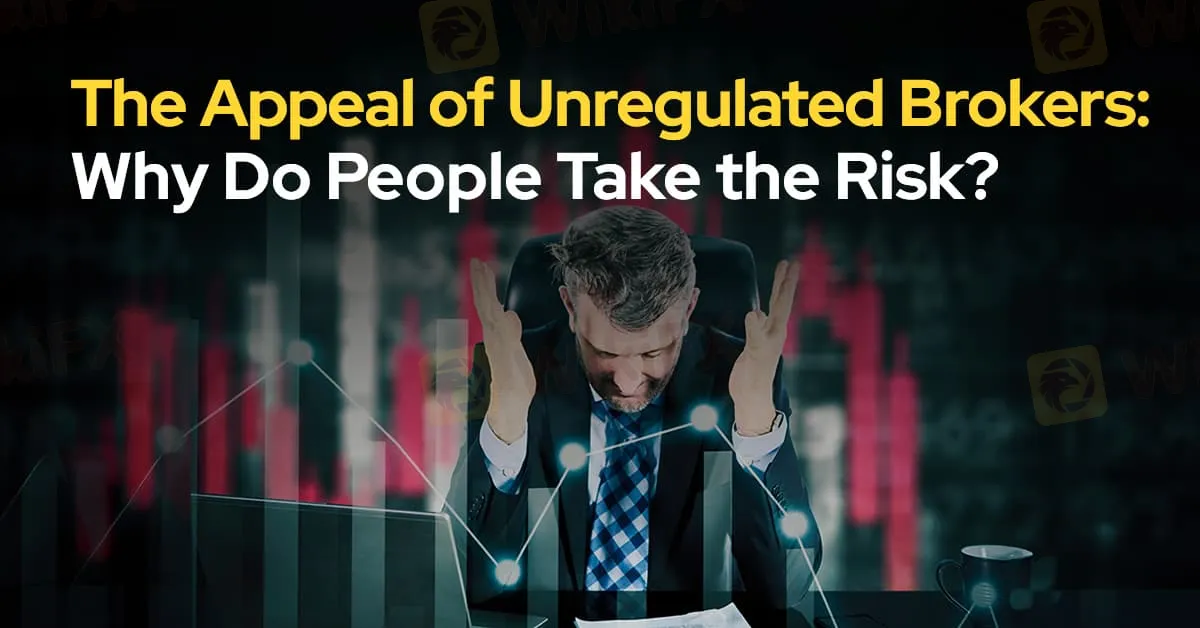The Appeal of Unregulated Brokers: Why Do People Take the Risk?
Abstract:While it seems like a no-brainer to opt for a broker with regulatory oversight, many traders are still drawn to unregulated brokers. The question is: why do some traders take the risk?

When navigating the world of online trading, one of the most critical decisions traders face is choosing between a regulated or unregulated broker. While it seems like a no-brainer to opt for a broker with regulatory oversight, many traders are still drawn to unregulated brokers. The question is: why do some traders take the risk? What factors make unregulated brokers so appealing, and could they ultimately lead to costly mistakes?
One of the most cited reasons is the promise of higher leverage. Unregulated brokers often offer much higher leverage ratios than their regulated counterparts, allowing traders to potentially amplify their returns on smaller capital. While regulators, such as the European Securities and Markets Authority (ESMA), impose leverage caps to protect traders from extreme losses, some traders view these limitations as a hindrance to maximizing their profits. Unregulated brokers remove such barriers, making them attractive to traders with a high-risk appetite.
Another draw is the perceived freedom from bureaucratic constraints. Regulated brokers must adhere to strict guidelines that can sometimes result in slower execution speeds, additional verification processes, and limited product offerings. Traders seeking flexibility may prefer the seemingly unrestrained environment of an unregulated broker, where processes are often faster and more accessible.

However, the very same factors that make unregulated brokers attractive could also be their downfall. A lack of oversight means a lack of accountability, and in the fast-paced world of online trading, this can lead to serious red flags. Fraudulent activities, such as price manipulation, unfair trading conditions, or even the outright refusal of withdrawal requests, are not uncommon. Traders may also encounter sudden changes in trading conditions, such as spreads widening without notice or even asset unavailability, leading to unanticipated losses.
The question remains: is the promise of higher leverage and fewer constraints worth the potential risks? For some traders, the answer may be yes. They believe their skills and knowledge can mitigate the risks associated with unregulated brokers. However, for others, the red flags—ranging from limited customer protection to the possibility of fraudulent activity—are too significant to ignore.
Ultimately, the debate boils down to whether the short-term rewards of unregulated brokers are worth the long-term risks. Should traders gamble on the potential for greater profits, or is the safety net provided by regulation too valuable to discard? As with many aspects of online trading, the decision may depend more on a trader's risk tolerance than on any clear-cut answer.

Read more

MultiBank Group Wins Big at Traders Fair Hong Kong 2024
Discover how MultiBank Group, a global leader in financial derivatives, secured three prestigious awards at Traders Fair Hong Kong 2024, highlighting its innovative trading solutions and industry excellence.

Doo Financial Expands Reach with Indonesian Regulatory Licenses
PT. Doo Financial Futures, a subsidiary of the global financial services brand Doo Group, has secured regulatory approval from Indonesia’s Badan Pengawas Perdagangan Berjangka Komoditi (BAPPEBTI).

Webull Canada Expands Options Trading to TFSAs and RRSPs
Webull Canada launches options trading for TFSAs and RRSPs, offering Canadian investors tax-free growth and retirement savings optimization opportunities.

Interactive Brokers Boosts IBKR Desktop with Advanced Tools
Interactive Brokers upgrades IBKR Desktop with powerful tools like MultiSort, Option Lattice, and enhanced charting, simplifying global trading for all skill levels.
WikiFX Broker
Latest News
Geopolitical Events: What They Are & Their Impact?
Volkswagen agrees deal to avoid Germany plant closures
Top 10 Trading Indicators Every Forex Trader Should Know
TradingView Launches Liquidity Analysis Tool DEX Screener
MultiBank Group Wins Big at Traders Fair Hong Kong 2024
WikiEXPO Global Expert Interview: Simone Martin—— Exploring Financial Regulation Change
'Young investors make investment decisions impulsively to keep up with current trends' FCA Reveals
Why Do You Feel Scared During Trade Execution?
CySEC Settles Compliance Case with Fxview Operator Charlgate Ltd
Malaysian Influencer Detained in Taiwan Over Alleged Role in Fraud Scheme
Rate Calc
